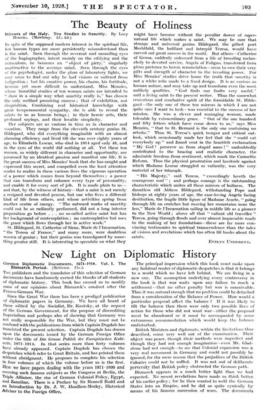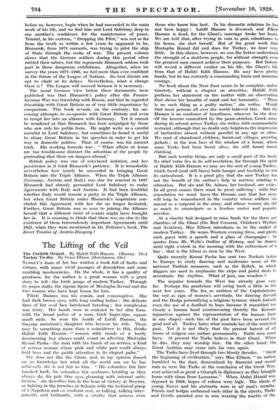New Light on Diplomatic History
Tut: publishers and the translator of this selection of German documents have handsomely earned the thanks of all students of diplomatic history. This book has caused us to modify some of our opinions about Bismarck's conduct after the Franco-German War.
Since the Great War there has been a prodigal publication
of diplomatic papers in Germany. We have all heard of•those edited by the Socialist, Dr. Kautsky, at the request of the German Governrnent, for the purpose of discrediting' Imperialism and perhaps also of showing that Germany was riot really responsible for the War, but they must not be confused with the publications from which Captain Dugdale has translated the present selection. Captain Dugdale has drawn Upon the documents issued by the German Foreign Office Under the title of Die Grosse Politik der Europdischen Kabi- net-le, 1871-1914. In that series more than forty volumes have already appeared. Captain Dugdale has chosen the despatches which refer to Great Britain, and has printed them Without abridgment. He proposes to complete his selection in four volumes of which-the volume before us is the first. Ilere we have.papers dealing with the years 1871-1880 and covering such famous subjects as the Congress at Berlin, the Triple Alliance, the rise of German Colonial Policy, Egypt, and Zanzibar. There is a Preface by Sir Rennell Redd, and au Introduction by Dr. J. W. Headlaro-Morley, Historical Adviser to the Foreign Office.
The principal impression which this book must make upon any habitual reader of diplomatic despatches is that it belongs to a world which we have left behind. We are living in a new one. The assumption underlying every controversy in the book is that war waits upon any failure to reach a settlement—that no other penalty but war is conceivable. Thus it was natural enough that no problem could be detached from a consideration of the Balance of Power. How would a. particular proposal affect the balance ? If it was likely to tilt the balance then there were only two possible lines of action for those who did not want war—either the proposal must be abandoned or it must be accompanied by sonic extraneous accommodation which would keep the balance undisturbed.
British Ministers and diplomats, within the limitations thus described, come very well out of the examination. Their object was peace, though their methods were imperfect and though they had not enough imagination—even Mr. Glad- stone had not enough—to see that Colonial expansion was a very real movement in Germany and could not possibly be ignored, for the mere reason that the prejudices of the British Colonies could not be ruffled. It was not out of deliberate perversity that British policy obstructed the German path.
Bismarck appears in a much better light than we had expected. No recent revelations have made us think better, of his earlier policy ; for he then wanted to weld the German States into an Empire, and he did so quite cynically by means of his famous succession of wars. The documents before us, however, begin when he had succeeded in the main work of his life, and we find him and Lord Salisbury deep in one another's confidence for the maintenance of peace. Tenniel, in his cartoon, "Dropping the Pilot," was not so far from the truth as within a few years he appeared to be. Bismarck, from 1871 onwards, was trying to pilot the ship of State through the rocks of war. The present volume shows that the German soldiers during this period often rattled their sabres, but the regenerate Bismarck seldom took part in those dangerous exhibitions. Altogether, when we survey the years 1871-1890, we feel more than ever confident in the future of the League of Nations. Its best friends are apt to chafe at its delays. Nevertheless, what a change there is ! The League will succeed because it is necessary.
The usual German view before these documents were pablished was that Bismarck's policy after the Franco- German War was friendship with Russia, and that he regarded friendship with Great Britain as of very little importance by comparison. This book reveals, on the contrary, his un- ceasing attempts to co-operate with Great Britain and even to tempt her into an alliance with Germany. Yet it cannot be wondered at that Bismarck has been misjudged by those who saw only his public form. He might write as a careful moralist to Lord Salisbury, but sometimes he found it useful to abuse Great Britain in his speeches in order to get his way in domestic politics. That, of course, was his ancient trick. His working formula was : "When affairs at home are too troublesome distract the attention of the people by pretending that there are dangers abroad."
British policy was one of convinced isolation, and her persistence in it tried Bismarck's patience. It is remarkable nevertheless how nearly he succeeded in bringing Great Britain into the Triple Alliance. When the Triple Alliance (Germany, Austria, and Italy) was due for renewal in 1887 Bismarck had already persuaded Lord Salisbury to make Agreements with Italy and Austria. It had been doubtful whether Italy would remain a party to the Triple Alliance, but when Great Britain under Bismarck's inspiration con- cluded this Agreement with her she no longer hesitated. Further, Great Britain was so near to joining the Alliance herself that a different twist of events might have brought her in. It is amazing to think that there was no clue to the existence of these tremendously important Agreements until 1921, when they were mentioned in Dr. Pribram's book, The Secret Treaties of Austria-Hungary!













































 Previous page
Previous page